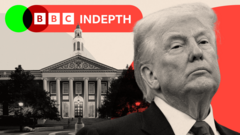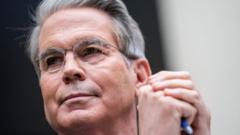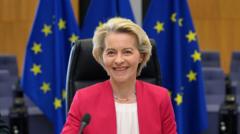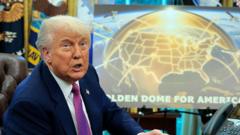Elon Musk has openly criticized former President Donald Trump’s recent multi-trillion dollar tax and spending bill, expressing disappointment during an interview. Musk, who played a significant role in Trump's earlier cost-cutting efforts, argues that the legislation undermines progress made in reducing government spending.
Musk Expresses Disappointment Over Trump's Spending and Tax Bill
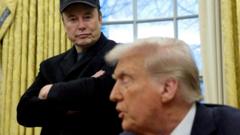
Musk Expresses Disappointment Over Trump's Spending and Tax Bill
Elon Musk critiques Trump's "big, beautiful" bill, signaling a rift in their alliance.
Musk’s comments came after the US House of Representatives passed Trump's tax and spending bill, which includes substantial tax breaks and a promise of increased defense expenditure. While speaking with CBS News, Musk stated that the plan "undermines" his previous initiatives that aimed to curb government costs. He noted that the proposed bill could lead to an increase in the federal budget deficit by up to $600 billion in the next fiscal year.
Trump’s tax and spending plan, described by him as a "big, beautiful bill," has faced backlash within various factions of his own Republican Party. Despite Musk’s criticism, Trump expressed both satisfaction and discontent with the bill's provisions. He confirmed that while he is thrilled about certain elements, such as tax cuts, there are aspects he is “not happy about.”
Historically, Musk has supported Trump, even contributing more than $250 million to his campaign, but his recent remarks suggest a potential distancing from the former president. As the architect of the federal cost-cutting program known as the Department of Government Efficiency (Doge), Musk aimed to cut $1 trillion in spending by targeting wasteful government contracts.
Musk’s comments reflect ongoing tensions regarding fiscal policy within the Republican Party, as some members support aggressive tax cuts and increased government spending while others, like Musk, call for fiscal restraint. The conflicts within GOP leadership over spending priorities are becoming increasingly visible as the party navigates its identity in the wake of Trump's presidency.
Musk’s critique of the spending bill also coincides with his intention to reduce political donations in the future, emphasizing his commitment to Tesla and suggesting a desire to refocus his efforts on business.
In a rapidly evolving political landscape, Musk's disappointment with Trump's policies signals ongoing debates over government spending priorities and fiscal responsibility among conservative leaders and their constituents.
Trump’s tax and spending plan, described by him as a "big, beautiful bill," has faced backlash within various factions of his own Republican Party. Despite Musk’s criticism, Trump expressed both satisfaction and discontent with the bill's provisions. He confirmed that while he is thrilled about certain elements, such as tax cuts, there are aspects he is “not happy about.”
Historically, Musk has supported Trump, even contributing more than $250 million to his campaign, but his recent remarks suggest a potential distancing from the former president. As the architect of the federal cost-cutting program known as the Department of Government Efficiency (Doge), Musk aimed to cut $1 trillion in spending by targeting wasteful government contracts.
Musk’s comments reflect ongoing tensions regarding fiscal policy within the Republican Party, as some members support aggressive tax cuts and increased government spending while others, like Musk, call for fiscal restraint. The conflicts within GOP leadership over spending priorities are becoming increasingly visible as the party navigates its identity in the wake of Trump's presidency.
Musk’s critique of the spending bill also coincides with his intention to reduce political donations in the future, emphasizing his commitment to Tesla and suggesting a desire to refocus his efforts on business.
In a rapidly evolving political landscape, Musk's disappointment with Trump's policies signals ongoing debates over government spending priorities and fiscal responsibility among conservative leaders and their constituents.


